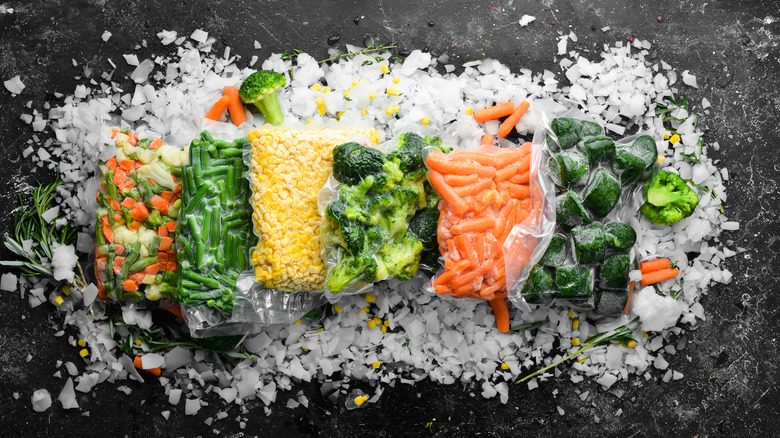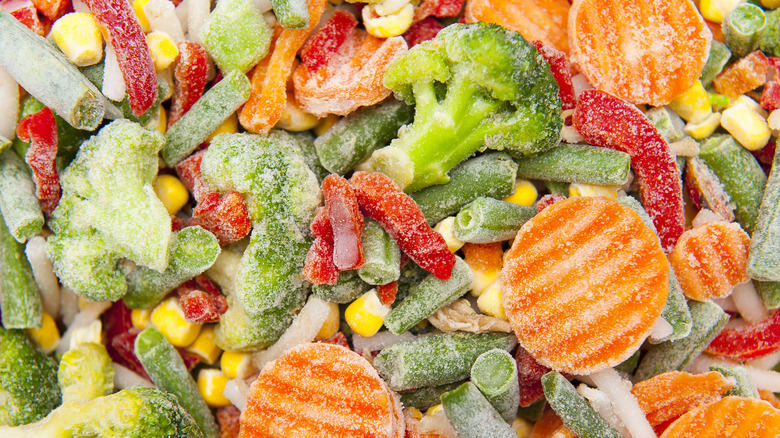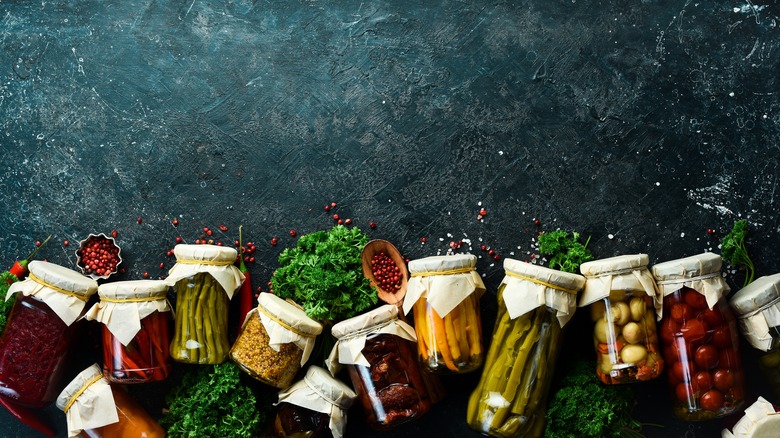The Mistake You Want To Avoid When Cooking With Frozen Veggies
Many of today's great inventions come from the 1920s. Band-Aids, blenders, hair dryers, even cheeseburgers. According to the Hancock Historical Museum, these innovative concepts were created to simplify home life after WWI's hardships. That said, one of the most beneficial inventions that eased the everyday stress of cooking was quick-frozen foods, including vegetables.
Eater notes that much like today, freezing excess food to prevent it from spoiling was not an uncommon phenomenon back then. In fact, it had been practiced for nearly 1,000 years before Clarence Birdseye's quick-freezing method in the 1920s. While living in Canada, Birdseye often watched the Inuit fish for food in the country's polar northern regions. Once caught, they would let it sit out on the ice, and with the help of the biting wind and air, the fish froze instantly after it was retrieved, per LOC. Unlike other slow-frozen meals at the time, which became mushy when thawed, Clarence Birdseye found that the quick-freezing method effectively retained a food's structure and freshness.
Throughout the 1920s, Birdseye tried to replicate the Inuit's freezing methods in America, notes Eater. By 1930, the first packages of Birds Eye Frosted Food Company hit the shelves, including items such as fish, meat, fruits, and of course, veggies. Now, when browsing the shelves at the local grocery store, consumers can enjoy quick-frozen vegetables that retain their full flavor and nutritional value. Still, it's important to remember a few rules before using these frozen foods in the kitchen.
Mistakes to avoid with frozen veggies
Selecting frozen vegetables from the supermarket is just as essential as cooking them. HuffPost recommends feeling around for clumps in bags of frozen veggies, as this can indicate loss of moisture within the vegetable (and therefore freshness) before it's even been opened. By selecting a bag where the veggies feel separated and dislodged, you can rest assured that they've retained their original state and texture.
When cooking with preserved ingredients, it's recommended to thaw frozen grains and meats before consuming them. But the same does not go for frozen veggies, except for corn on the cob and leafy greens, The Spruce Eats explains. It goes against the purpose of fast-freezing and can cause vegetables to become mushy and undesirable, which Birdseye desperately tried to avoid. Instead, cook them straight from the bag on a frying pan or include them as a frozen ingredient in soups or oven-baked meals, such as casseroles or pot pies. However, avoid mixing them with fresh veggies, as the textural difference can be unappealing on the palate.
After using your frozen veggies, it's possible to have some leftovers. While these are perfectly fine to preserve, don't forget them. As HuffPost explains, frigid air from the freezer stops harmful bacteria from spoiling the food, but it doesn't freeze the enzymes that keep it crisp and fresh. It is encouraged to consume your leftover (or unopened) frozen veggies within one year.
Canned vs. frozen: Which is better?
Besides freezing foods, another form of preservation is canning. Canned foods and vegetables have played an integral part in our society for centuries. According to Clemson University's Home & Garden Information Center (HGIC), canned vegetables undergo a unique process to preserve their taste and nutritional value. But how do they compare to frozen veggies?
After they are placed in jars, these foods are heated to 240 F to kill harmful bacteria that can cause them to rot, spoil, or become diseased, per the HGIC. Heat also removes any excess air (and hazardous air-borne microorganisms) from the jar. Once the heat dissipates, the lid is suctioned to the top and cannot be removed unless forcibly opened. Seems full-proof, right? The truth is: not exactly. Canned vegetables are often packed with preservatives, such as salt and sugar, that extend their shelf life. Additionally, the Center for Environmental Health states that the cans used in heating, cooling, and packaging can contain bisphenol-A (BPA), a carcinogenic chemical known to cause birth defects. In 2017, the organization noted that a little less than half of the 250 canned foods tested for BPA came back with positive results.
Many health experts suggest using frozen vegetables over canned ones for their ability to retain nutritional benefits, per Hawaii's National Kidney Foundation. Sometimes, they can even keep more vitamins and nutrients inside than fresh produce, notes Food Network.


